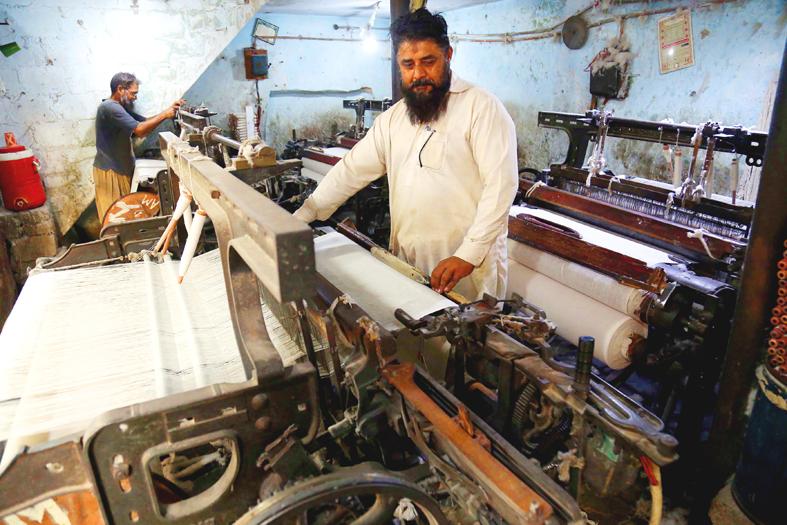Pakistan’s textile sector is bringing cheer to its flailing economy, with exports set to swell to a record after gaining an edge over South Asian rivals during the COVID-19 pandemic.
Textile exports are poised to surge 40 percent from a year earlier to a record US$21 billion in the 12 months ending in June, said Abdul Razak Dawood, commerce adviser to Pakistan’s prime minister.
Dawood said that the figure would expand to US$26 billion in the next fiscal year, surpassing the nation’s total exports last year, he said.

Photo: EPA-EFE
The textiles industry — which supplies everything from denim jeans to towels for buyers in the US and Europe — is one of the country’s few economic bright spots. Textiles amount to about 60 percent of Pakistan’s exports, and the nation allowed its factories to open ahead of India and Bangladesh when the pandemic emerged in 2020, drawing orders from global brands including Target Corp and Hanesbrands Inc.
“A lot of orders actually were shifted from Bangladesh and India to Pakistan” during the pandemic, Dawood said. “The other good thing that’s happening is we are now becoming competitive with Bangladesh. Three, four years ago, Bangladesh was really beating us.”
The government also plans to announce a proposal next month to provide incentives for exports to new markets such as Africa, South America and Central Asia, Dawood said.
The nation is doubling down to boost textile exports through measures including tax breaks, cheap loans and supplying electricity at rates comparable to rivals in South Asia. A 60 percent decline in the local currency against the US dollar since 2018 has also helped.
“Pakistan’s exports have become competitive over the past few years,” Ismail Iqbal Securities CEO Ahfaz Mustafa said. “There is a fixed energy tariff regime that keeps in mind regional prices. The government is much quicker to refund the money it owes exporters and there has been a giant currency devaluation.”
The South Asian nation is looking to increase its exports to get out of regular boom-bust economic cycles that have led it to seek help from the IMF 13 times since the late 1980s. It is also trying to revive a US$6 billion bailout program to meet financing requirements amid a record trade deficit.
Pakistan’s commerce adviser said there is “very little” that can be done about the nation’s record-high imports, which are driven mainly by purchases of petroleum products and vaccines.
Pakistan would be “under pressure” if oil hits US$100 a barrel, Dawood said.
He expects food-related imports to decline this year following a better domestic crop harvest.
The nation is also pushing to intensify trade with Central Asian nations by signing agreements and allowing free movement of trucks. Trade has grown to US$120 million in six months of the current fiscal year from US$14 million of the entire previous year, he said.

In Italy’s storied gold-making hubs, jewelers are reworking their designs to trim gold content as they race to blunt the effect of record prices and appeal to shoppers watching their budgets. Gold prices hit a record high on Thursday, surging near US$5,600 an ounce, more than double a year ago as geopolitical concerns and jitters over trade pushed investors toward the safe-haven asset. The rally is putting undue pressure on small artisans as they face mounting demands from customers, including international brands, to produce cheaper items, from signature pieces to wedding rings, according to interviews with four independent jewelers in Italy’s main

Macronix International Co (旺宏), the world’s biggest NOR flash memory supplier, yesterday said it would spend NT$22 billion (US$699.1 million) on capacity expansion this year to increase its production of mid-to-low-density memory chips as the world’s major memorychip suppliers are phasing out the market. The company said its planned capital expenditures are about 11 times higher than the NT$1.8 billion it spent on new facilities and equipment last year. A majority of this year’s outlay would be allocated to step up capacity of multi-level cell (MLC) NAND flash memory chips, which are used in embedded multimedia cards (eMMC), a managed

Japanese Prime Minister Sanae Takaichi has talked up the benefits of a weaker yen in a campaign speech, adopting a tone at odds with her finance ministry, which has refused to rule out any options to counter excessive foreign exchange volatility. Takaichi later softened her stance, saying she did not have a preference for the yen’s direction. “People say the weak yen is bad right now, but for export industries, it’s a major opportunity,” Takaichi said on Saturday at a rally for Liberal Democratic Party candidate Daishiro Yamagiwa in Kanagawa Prefecture ahead of a snap election on Sunday. “Whether it’s selling food or

In the wake of strong global demand for AI applications, Taiwan’s export-oriented economy accelerated with the composite index of economic indicators flashing the first “red” light in December for one year, indicating the economy is in booming mode, the National Development Council (NDC) said yesterday. Moreover, the index of leading indicators, which gauges the potential state of the economy over the next six months, also moved higher in December amid growing optimism over the outlook, the NDC said. In December, the index of economic indicators rose one point from a month earlier to 38, at the lower end of the “red” light.